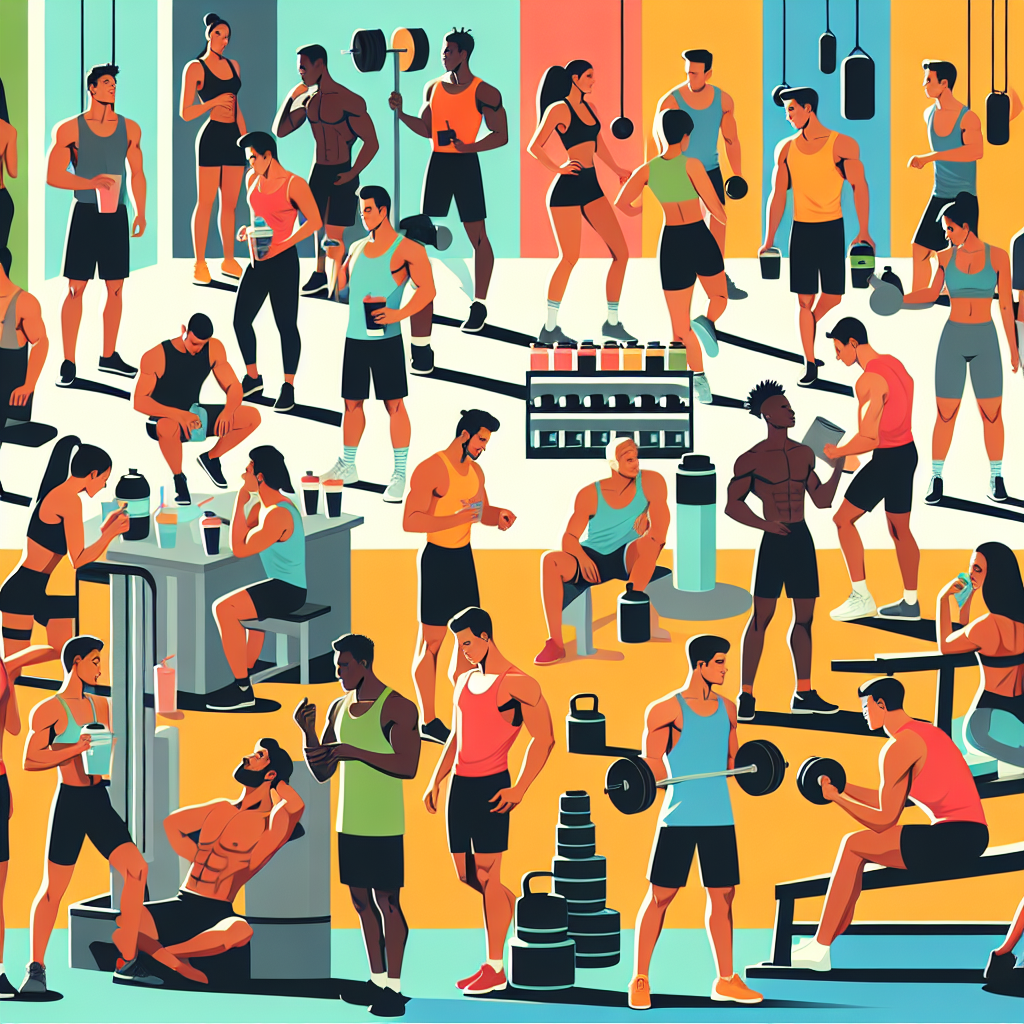A new study found that young people using protein shakes and other supplements might develop a problem called muscle dysmorphia. This problem makes people worry too much about not having enough muscles. Dr. Kyle Ganson from the University of Toronto led the study. They looked at 2,731 people aged 16 to 30 and saw that using more supplements made the problem worse.
Muscle dysmorphia makes people think their bodies are not muscular enough, even if they are. This can make them feel very upset and avoid social activities. Dr. Gail Saltz said that even if they get the muscles they want, they still feel unhappy. The study shows that people need to know about the risks of using these supplements because they might not be as safe as they think.
The study also worries about how easy it is to buy these supplements, which might not be safe. Dr. Jason Nagata mentioned that while not many young men use steroids, many use protein powders. These supplements might lead to using steroids and risky habits like “dry scooping.” To help people with muscle dysmorphia, we need to change how society views body image and use therapy to help them think differently about their bodies.
Original news source: Muscle-building supplements may put teens at risk for a body image disorder, study finds (CNN)
🎧 Listen:
Slow
Normal
Fast
📖 Vocabulary:
| 1 | supplements | Extra things you take to make your body stronger or healthier |
| 2 | dysmorphia | A problem where someone sees their body in a way that isn’t true |
| 3 | muscular | Having strong and well-defined muscles |
| 4 | steroids | Drugs that some people use to get bigger muscles quickly |
| 5 | therapy | Talking to someone to help solve problems or feel better |
| 6 | society | A group of people living together in a community |
| 7 | protein | A type of nutrient found in foods like meat and beans |
| 8 | develop | To grow or change into something over time |
| 9 | avoid | To stay away from something |
| 10 | risks | Chances of something bad happening |
| 11 | habits | Things you do often, usually without thinking |
| 12 | image | The way something looks or is seen by others |
Group or Classroom Activities
Warm-up Activities:
– CHARADES
Instructions: Students will take turns acting out words or phrases related to the article, such as “protein shake,” “muscle,” “exercise,” or “body image.” The rest of the class will guess what they are acting out. This activity helps with vocabulary retention and encourages speaking.
– OPINION POLL
Instructions: Create a list of statements related to body image and supplements, such as “Using protein shakes is good for health” or “People should not worry about their muscles.” Students will walk around the room and ask their classmates if they agree or disagree with each statement, tallying results. This will promote speaking and listening skills.
– MIND MAP
Instructions: On a large sheet of paper, students will create a mind map about muscle dysmorphia and supplements. They will include terms from the article, such as “risk,” “therapy,” “body image,” and “social activities.” This visual activity helps with organizing thoughts and vocabulary.
– VOCABULARY PICTIONARY
Instructions: Divide the class into small groups. One student from each group will draw terms related to the article (like “muscle,” “supplement,” or “therapy”) on the board while their teammates guess the word. This activity enhances vocabulary understanding and teamwork.
– TWO TRUTHS AND A LIE
Instructions: Each student will come up with two true statements and one false statement about muscle dysmorphia or supplements based on the article. They will share their statements with the class, and others will guess which one is the lie. This encourages critical thinking and speaking practice.
🤔 Comprehension Questions:
1. What is muscle dysmorphia?
2. Who led the study about muscle dysmorphia?
3. How many people were looked at in the study?
4. What happens to people with muscle dysmorphia?
5. What do some young people use to try to get bigger muscles?
6. Why is it important to know about the risks of supplements?
7. What can help people with muscle dysmorphia feel better about their bodies?
Go to answers ⇩
🎧✍️ Listen and Fill in the Gaps:
A new (1)______ found that young (2)______ using protein shakes and other (3)______ might develop a problem called muscle dysmorphia. This problem makes people worry too much about not having enough muscles. Dr. Kyle Ganson from the University of Toronto led the study. They looked at 2,731 people aged 16 to 30 and saw that using (4)______ supplements made the problem worse.
Muscle dysmorphia (5)______ people think their bodies are not muscular enough, even if they are. This can make them feel very upset and avoid social activities. Dr. Gail Saltz (6)______ that even if they get the muscles they want, they still (7)______ unhappy. The study shows that people need to know about the risks of using these supplements because they might not be as safe as they think.
The study also worries about how (8)______ it is to buy these supplements, which might not be safe. Dr. Jason (9)______ mentioned that while not many young men use steroids, many use protein powders. These supplements might lead to using steroids and risky habits like “dry scooping.” To (10)______ people with (11)______ dysmorphia, we need to change how society views body image and use therapy to help them (12)______ differently about their bodies.
Go to answers ⇩
💬 Discussion Questions:
Students can ask a partner these questions, or discuss them as a group.
1. What is a protein shake? Have you ever tried one?
2. How would you feel if you thought you were not strong enough?
3. Do you think it is important to have strong muscles? Why or why not?
4. Have you ever felt unhappy about your body? What happened?
5. What is a supplement? Do you think they are good for you?
6. How would you feel if you saw a friend using protein supplements?
7. Do you like exercising to get stronger? Why or why not?
8. What do you think about how people see their bodies? Is it important?
9. Do you think it is easy to buy protein shakes and supplements? Why?
10. How would you feel if someone told you to change your body?
11. Do you think talking to someone can help with feeling unhappy about your body? Why?
12. What is a healthy way to feel good about your body?
Individual Activities
📖💭 Vocabulary Meanings:
Match each word to its meaning.
Words:
1. supplements
2. dysmorphia
3. muscular
4. steroids
5. therapy
6. society
7. protein
8. develop
9. avoid
10. risks
11. habits
12. image
Meanings:
(A) Extra things you take to make your body stronger or healthier
(B) The way something looks or is seen by others
(C) A problem where someone sees their body in a way that isn’t true
(D) To stay away from something
(E) Talking to someone to help solve problems or feel better
(F) To grow or change into something over time
(G) A type of nutrient found in foods like meat and beans
(H) Chances of something bad happening
(I) Drugs that some people use to get bigger muscles quickly
(J) A group of people living together in a community
(K) Having strong and well-defined muscles
(L) Things you do often, usually without thinking
Go to answers ⇩
🔡 Multiple Choice Questions:
1. What is muscle dysmorphia?
(a) A problem where people worry about not having enough muscles
(b) A type of exercise
(c) A kind of protein shake
(d) A type of diet
2. Who led the study about muscle dysmorphia?
(a) Dr. Gail Saltz
(b) Dr. Jason Nagata
(c) Dr. John Smith
(d) Dr. Kyle Ganson
3. How many people were looked at in the study?
(a) 1,500
(b) 3,000
(c) 2,731
(d) 5,000
4. What can muscle dysmorphia make people feel?
(a) Upset
(b) Happy
(c) Excited
(d) Sleepy
5. What do many young men use instead of steroids?
(a) Vitamins
(b) Protein powders
(c) Energy drinks
(d) Water
6. What is one risky habit mentioned in the article?
(a) Running
(b) Dry scooping
(c) Swimming
(d) Eating vegetables
7. What does the study suggest people need to know about supplements?
(a) They are always safe
(b) They are only for athletes
(c) They might not be as safe as they think
(d) They make you stronger instantly
8. What is one way to help people with muscle dysmorphia?
(a) Ignore their feelings
(b) Tell them to exercise more
(c) Give them more protein shakes
(d) Change how society views body image
Go to answers ⇩
🕵️ True or False Questions:
1. To help people with muscle dysmorphia, we need to change how society sees body image.
2. People with muscle dysmorphia might feel upset and avoid social activities.
3. A new study found that young people might have a solution called muscle dysmorphia.
4. Using more supplements can make muscle dysmorphia better.
5. The study looked at 2,731 animals aged 16 to 30.
6. Muscle dysmorphia makes people worry about having too many muscles.
7. Some young men use protein powders, even if not many use steroids.
8. Dr. Kyle Ganson from the University of Toronto led the study.
Go to answers ⇩
📝 Write a Summary:
Write a summary of this news article in two sentences.
Check your writing now with the best free AI for English writing!
Writing Questions:
Answer the following questions. Write as much as you can for each answer.
Check your answers with our free English writing assistant!
1. What is muscle dysmorphia, and how does it make people feel about their bodies?
2. Who led the study about muscle dysmorphia?
3. What did the study find about young people using protein shakes and supplements?
4. Why is it a problem that supplements are easy to buy?
5. What are two ways suggested to help people with muscle dysmorphia?
✅ Answers
🤔✅ Comprehension Question Answers:
1. What is muscle dysmorphia?
Muscle dysmorphia is a problem where people worry too much about not having enough muscles, even if they are muscular.
2. Who led the study about muscle dysmorphia?
Dr. Kyle Ganson from the University of Toronto led the study.
3. How many people were looked at in the study?
The study looked at 2,731 people aged 16 to 30.
4. What happens to people with muscle dysmorphia?
People with muscle dysmorphia feel upset about their bodies and may avoid social activities because they think they are not muscular enough.
5. What do some young people use to try to get bigger muscles?
Some young people use protein shakes and other supplements to try to get bigger muscles.
6. Why is it important to know about the risks of supplements?
It is important to know about the risks of supplements because they might not be safe, and using them can lead to other problems.
7. What can help people with muscle dysmorphia feel better about their bodies?
Changing how society views body image and using therapy can help people with muscle dysmorphia feel better about their bodies.
Go back to questions ⇧
🎧✍️✅ Listen and Fill in the Gaps Answers:
(1) study
(2) people
(3) supplements
(4) more
(5) makes
(6) said
(7) feel
(8) easy
(9) Nagata
(10) help
(11) muscle
(12) think
Go back to questions ⇧
📖💭✅ Vocabulary Meanings Answers:
1. supplements
Answer: (A) Extra things you take to make your body stronger or healthier
2. dysmorphia
Answer: (C) A problem where someone sees their body in a way that isn’t true
3. muscular
Answer: (K) Having strong and well-defined muscles
4. steroids
Answer: (I) Drugs that some people use to get bigger muscles quickly
5. therapy
Answer: (E) Talking to someone to help solve problems or feel better
6. society
Answer: (J) A group of people living together in a community
7. protein
Answer: (G) A type of nutrient found in foods like meat and beans
8. develop
Answer: (F) To grow or change into something over time
9. avoid
Answer: (D) To stay away from something
10. risks
Answer: (H) Chances of something bad happening
11. habits
Answer: (L) Things you do often, usually without thinking
12. image
Answer: (B) The way something looks or is seen by others
Go back to questions ⇧
🔡✅ Multiple Choice Answers:
1. What is muscle dysmorphia?
Answer: (a) A problem where people worry about not having enough muscles
2. Who led the study about muscle dysmorphia?
Answer: (d) Dr. Kyle Ganson
3. How many people were looked at in the study?
Answer: (c) 2,731
4. What can muscle dysmorphia make people feel?
Answer: (a) Upset
5. What do many young men use instead of steroids?
Answer: (b) Protein powders
6. What is one risky habit mentioned in the article?
Answer: (b) Dry scooping
7. What does the study suggest people need to know about supplements?
Answer: (c) They might not be as safe as they think
8. What is one way to help people with muscle dysmorphia?
Answer: (d) Change how society views body image
Go back to questions ⇧
🕵️✅ True or False Answers:
1. To help people with muscle dysmorphia, we need to change how society sees body image. (Answer: True)
2. People with muscle dysmorphia might feel upset and avoid social activities. (Answer: True)
3. A new study found that young people might have a solution called muscle dysmorphia. (Answer: False)
4. Using more supplements can make muscle dysmorphia better. (Answer: False)
5. The study looked at 2,731 animals aged 16 to 30. (Answer: False)
6. Muscle dysmorphia makes people worry about having too many muscles. (Answer: False)
7. Some young men use protein powders, even if not many use steroids. (Answer: True)
8. Dr. Kyle Ganson from the University of Toronto led the study. (Answer: True)
Go back to questions ⇧














